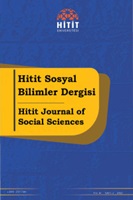Kredi temerrüt takas primi volatilitesi ve seçilmiş makroekonomik değişkenlerle olan ilişkisi: Türkiye örneği
Credit Default Swap Premium Volatility and its Relationship With Selected Macroeconomic Variables: The Case of Türkiye
Author(s): Mustafa Cevik, Dilek Şahin ÇevikSubject(s): National Economy, Supranational / Global Economy, Socio-Economic Research
Published by: Hitit Üniversitesi
Keywords: Credit Default Swap Premium; GJR-GARCH Model; Volatility; ARDL Boundary Test; Cointegration Test;
Summary/Abstract: In this study, in the first part of the empirical application, we examined the volatility observed in Turkiye's country risk premium for the 2004-2022 period. Then, we investigated the short- and long-term relationship between the country risk premium and selected macroeconomic variables (dollar exchange rate, inflation, interest and BIST-100). In this context, in the study, volatility modeling was done with the ARMA(3,3)-GJR GARCH (1,1) model and then the ARDL bound test was applied. As a result of volatility modeling, the volatility resistance of shocks to the country risk premium system was found to be low. Again, as a result of volatility modeling, there is no leverage effect in the system according to the Asymmetry coefficient. Considering that the examined period is a long time period, possible structural breaks in the series were examined with the Break in Variance test and the four break dates found were included in the model. The invalidity of the model that included break dates in the variance equation and the low volatility resistance are noteworthy as mutually supporting results. As a result of the ARDL bounds test, a long-term cointegration relationship was determined between country risk premiums and macroeconomic variables used in the model. Considering the short and long term together in the ARDL model, it has been determined that the factor with the highest impact on country risk premiums is the capital market. While shocks originating from the general level of prices cause an increase in the country risk premium in the long term, significant effects from various lags on the country risk premium, one of the independent variables, were determined in the short term. According to the ECM calculated with short-term results in the ARDL model, 26% of the imbalance caused by the shock in the previous period is eliminated in the current period and long-term equilibrium is achieved.
Journal: Hitit Sosyal Bilimler Dergisi
- Issue Year: 16/2023
- Issue No: 2
- Page Range: 461-482
- Page Count: 22
- Language: Turkish

